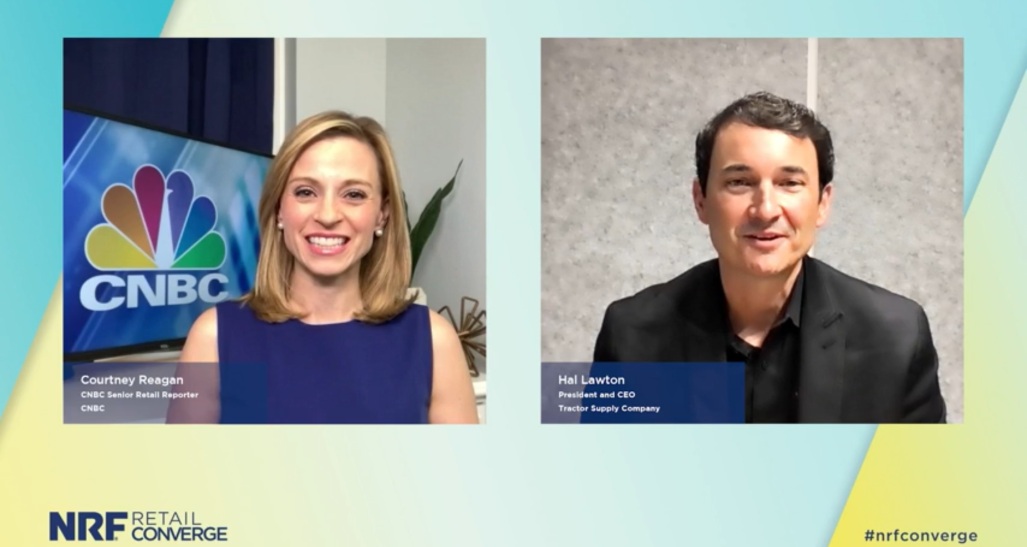
SAP’s Future of Consumer and Retail podcast recapped each day of the event. View all daily episodes here.
The days of viewing retail as monolithic are gone. It’s not only an industry that provides a place to shop — it’s a people-first machine built to serve. At NRF Retail Converge, June 21-25, business leaders looked at the depth and breadth of the retail industry and celebrated all disciplines contributing to the future of retail and its impact on people and the economy. Now that the event is over, you can log in to watch sessions on-demand on your own time. Here are some high-level takeaways from the event.
The store’s new responsibility is to provide meaningful brand experiences
“Even with the surge of ecommerce spending through the pandemic, it's still true that 80 percent of all purchases will take place in-store post-pandemic," said Mike George, president and CEO of Qurate Retail, Inc., during opening remarks.
If retailers can expect more foot traffic in-store, what exactly is a marketplace and why is it more than just a “store?” At NRF Retail Converge, we learned that the future of retail is no longer about the transaction, but about entertainment and experience. With the variety of choice consumers have, retailers must consider why the consumer is coming to them for products and services and how to provide meaningful experiences that ensure consumers keep coming back.
“We are in the middle of the third greatest retail revolution.”
— National Retail Federation (@NRFnews) June 23, 2021
- Rachel Dalton, Director of Ecommerce and Omnichannel Insights @Kantar#NRFConverge pic.twitter.com/gFhcVvZYzq
During his keynote conversation, former Best Buy CEO Hubert Joly said if retailers define their business as being a bricks-and-mortar retailer or being an online retailer, they’re missing the important question: What need are you solving? If retailers do not speak up and define who they are and what need they meet for the shopper, customers will leave the store and only shop where they feel appreciated.
CVS stores are a strong example of intentional retail because they often reflect their neighboring community, said CVS Pharmacy/Retail President Neela Montgomery. “We are trying to tailor the right CVS for the right community and customer need,” she said.
Nordstrom Rack is also looking into hyper-local stores. Customer activity on its website can signal where physical Nordstrom stores could better serve customers in small communities, said Nordstrom Rack President Geevy Thomas. "We think there's opportunities to be in smaller communities and have a tailored offer," he said.
"'What is the purpose of our store?' I think that question needs to be asked and answered by #retailers."
— National Retail Federation (@NRFnews) June 22, 2021
- @UPS CEO @CarolBTome #NRFConverge
Retail experiences are omnichannel and omni-serving
On-demand delivery, voice, augmented reality, visual search, artificial intelligence and more offer consumers choice and the ability to curate their experiences. Retail is personal, and consumers are shopping their values, with equality and sustainability among top priorities for a brand.
Retailers that always delivered on value found their operations accelerated during the pandemic as consumers spent time reflecting and sharing their thoughts about the direction the world is headed. “Investing through crisis can actually pay huge dividends,” said UPS CEO Carol Tomé, who made incremental changes to company culture including providing more lenience in the company’s appearance policy to ensure employees could bring their authentic selves to work.
Other improvements retailers made during the pandemic included personalizing payment methods, managing a more accessible returns process, and replicating touch and sight experiences digitally, all while staying under the theme of “convenience” and “omnichannel.”
“It’s not about online or offline, it’s about both,” said Alibaba Group President J. Michael Evans during a keynote with fashion designer Diane von Furstenberg. Kohl’s CEO Michelle Gass echoed that sentiment: “Our shoppers shopping digitally and in store are more productive and more loyal,” she said.
.@Kohls CEO Michelle Gass says brick and mortar is their strength. "We've never been positioned better than as we sit here today." #NRFConverge
— National Retail Federation (@NRFnews) June 23, 2021
As values take priority, diversity, equity and inclusion always have a seat at the table
Since the coronavirus, people are working differently than ever before and need to be supported in a variety of ways. It’s important for retail leaders to understand what is going on at all levels of operations, from the front line to the C suite, to fully grasp the unique needs of their workers, with special consideration for the needs of women and other minorities.
“Understanding the makeup of your organization helps you understand your basic diversity baseline and highlight where you have opportunities," said Janet Sherlock, chief information officer at Ralph Lauren, during a conversation on how organizations can make the right investments in the right people.
Because it is people who ultimately drive retail, kindness for humanity and the people who make up the moving parts of retail is essential. COVID-19 showed there’s no playbook for surviving a crisis but retailers can rebound by “planning, protecting and recovering” with people at the center, said Southeastern Grocers President & CEO Anthony Hucker. Being a people-first retailer and acknowledging that retail is a sum of its parts becomes the fuel that runs the retail machine.
Building culture virtually included working with HR to develop more integrated teams among merchandising, marketing, store and supply chain @macys CEO Jeff Gennette tells Colleen Taylor, President of Merchant Services at U.S. @AmericanExpress. #NRFConverge pic.twitter.com/9ynt63Skxd
— National Retail Federation (@NRFnews) June 24, 2021
Listen to more highlights and takeaways from NRF Retail Converge in SAP Retail’s Future of Consumer and Retail podcast here.

